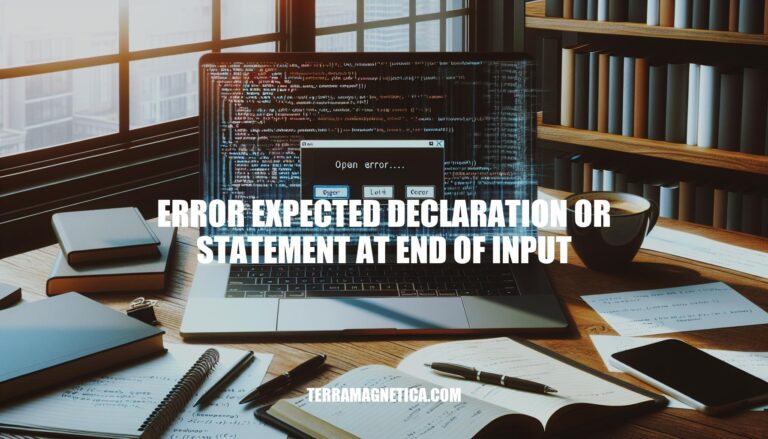


The “expected declaration or statement at end of input” error is a common syntax error in programming, particularly in languages like C and C++. This error occurs when the compiler reaches the end of a file or function without finding a complete statement or declaration, often due to missing brackets, semicolons, or parentheses. Understanding this error is crucial for debugging and ensuring that your code runs correctly, as even small syntax mistakes can prevent a program from compiling and executing as intended.
Here are some common causes of the “error expected declaration or statement at end of input” in programming, along with examples:
A missing semicolon at the end of a statement can cause this error. For example:
int main() {
printf("Hello, World!")
return 0;
}
In this case, the semicolon is missing after the printf statement.
A missing closing bracket can also trigger this error. For example:
int main() {
if (1) {
printf("Hello, World!");
// Missing closing bracket here
The closing bracket for the if statement is missing.
A missing parenthesis in a function call or condition can cause this error. For example:
int main() {
int x = 5;
if (x < 10
printf("x is less than 10\n");
return 0;
}
The closing parenthesis for the if condition is missing.
A missing closing curly brace for a function or block can also lead to this error. For example:
int main() {
printf("Hello, World!");
return 0;
// Missing closing curly brace here
The closing curly brace for the main function is missing.
These are some of the typical causes of this error. Carefully checking your code for these common mistakes can help you resolve it.
To identify the “error expected declaration or statement at end of input” in your code, follow these steps:
Check for Missing Braces: Ensure all opening { braces have corresponding closing } braces. This error often occurs when a closing brace is missing.
Look for Missing Semicolons: Verify that each statement ends with a semicolon ;. A missing semicolon can cause this error.
Review Parentheses: Ensure all opening ( parentheses have matching closing ) parentheses, especially in conditions and function calls.
Read the Error Message Carefully: The error message usually indicates the line where the compiler expected a declaration or statement. Start checking from this line upwards.
Check for Incomplete Statements: Make sure all statements are complete and properly terminated.
Use an IDE or Text Editor with Syntax Highlighting: This can help you spot missing braces, parentheses, or semicolons more easily.
By systematically checking these common issues, you can locate and fix the source of the error efficiently.
Here are the steps to fix the “error expected declaration or statement at end of input” in C, with specific examples and solutions for different scenarios:
Example:
int main() {
printf("Hello, World!")
return 0;
}
Solution:
Add a semicolon after the printf statement.
int main() {
printf("Hello, World!");
return 0;
}
Example:
#include <stdio.h>
int sum(int x, int y) {
return x + y;
// Missing closing bracket
int main() {
int result = sum(3, 4);
printf("The result is %d\n", result);
return 0;
}
Solution:
Add the missing closing bracket for the sum function.
#include <stdio.h>
int sum(int x, int y) {
return x + y;
} // Added closing bracket
int main() {
int result = sum(3, 4);
printf("The result is %d\n", result);
return 0;
}
Example:
int main() {
int x = 5;
if (x < 10
printf("x is less than 10\n");
return 0;
}
Solution:
Add the missing parenthesis in the if statement.
int main() {
int x = 5;
if (x < 10)
printf("x is less than 10\n");
return 0;
}
Example:
#include <stdio.h>
int main(void) {
printf("Hello world");
return 0;
// Missing closing curly brace
Solution:
Add the missing closing curly brace for the main function.
#include <stdio.h>
int main(void) {
printf("Hello world");
return 0;
} // Added closing curly brace
These are some common scenarios and their solutions for fixing the “error expected declaration or statement at end of input” in C. If you encounter this error, carefully review your code for missing semicolons, brackets, or parentheses.
Check for Missing Braces:
{ has a corresponding closing brace }.Verify Semicolons:
;.Parentheses and Brackets:
() and brackets [] are properly closed.Syntax Highlighting:
Consistent Indentation:
Write Clean and Readable Code:
Comment and Document:
Modularize Code:
Use Version Control:
Implement Logging:
Test Incrementally:
Use Debugging Tools:
Peer Reviews:
By following these strategies and best practices, you can minimize errors and improve your coding and debugging efficiency. Happy coding!
is often caused by missing semicolons, brackets, or parentheses.
To fix this error, carefully review your code for the following:
Additionally, consider using an editor with syntax highlighting to easily spot syntax errors. Maintaining consistent indentation can also help identify mismatches.
Follow best practices like writing clean and readable code, commenting and documenting your work, modularizing code, using version control, implementing logging, testing incrementally, utilizing debugging tools, and conducting peer reviews. By being meticulous with your coding and regularly debugging, you can minimize errors and improve your overall efficiency.